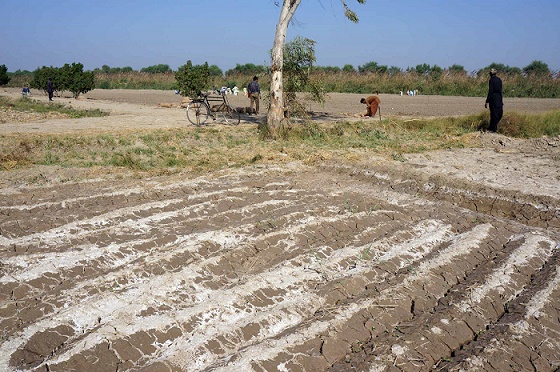Salty area in the country is increasing day by day due to climate change. Salinity in water and soil, along with other oceanic coasts of the world, is expanding more than ever in the low-lying coastal areas of Bangladesh. Already more than 3 crore 50 lakhs people in coastal districts of the country are struggling with salt water every day. On the other hand, 20-30 percent of the country's total cropland is saline, which is disrupting crop production, report says.
Again, salinity in drinking water is also a big threat to the public health of people in coastal areas of the country. In particular, public health experts claim that salt water is linked to high blood pressure, pre-eclampsia, heart disease, and increased infant mortality. Although economically favorable, humans are intentionally desalinating water in some areas as a result of shrimp farming, which is environmentally harmful. Experts also said that the area of permanent saline water and soil increases due to the effect of cyclones and tidal waves.
According to the sources of the Department of Fisheries, there are about 230,000 fish enclosures in the Satkhira, Khulna, and Bagerhat districts of the coastal southwest region. Among these, lobsters are farmed in fresh water and shrimps are farmed in salt water. According to the information from the Ministry of Agriculture, the amount of saline land has increased by 35.51 thousand hectares in a decade from 2000-2009 and on the other hand in four decades (1973-2009) the amount of saline land has increased to 2 lakh 23 thousand hectares.
Analyzing various data on climate, it can be seen that cyclones occur in Bangladesh every two to three years. In particular, the embankments overflowed and breached during cyclones Sidor (November 2007), Aila (May 2009), Mahasen (May 2013), Komen (July 2015), Fani (April 2019) and Amphan (May 2020), causing widespread flooding. Due to delays in repairing the broken embankment, the affected areas are inundated twice a day by tidal water for a long time. Soil and drinking water make pond water highly saline.
Sources from the Soil Resources Development Institute said that most of the land in 93 upazilas of 18 districts in the southwestern coastal area of the country is affected by salinity to varying degrees. Due to the salinity of the land, in this area, the production of Aman rice is falling throughout the year except during the monsoon season. Because relatively fresh water tide in the area comes in February or March. Boro paddy cultivation is not possible due to a lack of fresh water during the dry season.
Bidhan Kumar Bhandar, Agronomist of soil resources development institute said in an interview that salinity can increase due to various reasons. Salinity increases in the coastal areas of Bangladesh due to two natural causes. This is due to saltwater flooding the land during the tides, and groundwater seeping through capillary pores to the surface. Usually during the dry season (March-May), many lands are submerged in saline tidal water. Then the salt water spread to the land. If this water is used for irrigation, the soil or land becomes salty. On the other hand, when the monsoon ends, the soil starts drying from January to February. This causes many cracks in the soil. When the sun shines on the soil, the water evaporates from the surface of the soil and the saline water from the ground comes up through the cracks. Then the surface of the land is affected by salinity.
Dr. Bidhan Kumar Bhandar highlighted the research data said, it has been observed that due to salinity, the growth of plants decreases, the number of flowers decreases, and pollination does not even occur in many cases. As a result, the yield of crops decreases to different extents. Soil salinity increases the concentration of soil solutes. Then the less concentrated sap goes to the ground. As a result, the tree becomes dehydrated. Due to the high dissolved salts in saline soils, plants cannot easily absorb nutrients and water from the soil. Adverse effects also arise in the assimilation of absorbed substances.
Prof. Dr. Md Abdul Baten, Chairman of Bangladesh Agricultural University (BAU) Department of Environmental Science said that as the warming due to climate change increases, the sea level of our country will increase. Along with that, the salt water will spread further. As a result, the danger will increase.
Dr. Azizul Haque, Chief Scientific Officer of the Soil Science Department of Bangladesh Atomic Agriculture Research Institute said that the area of saline water and soil is increasing daily in the country, which affects agriculture. Various efforts are being made to produce saline-tolerant crops. However, the increase in salinity has repeatedly disrupted that initiative.
ZH






